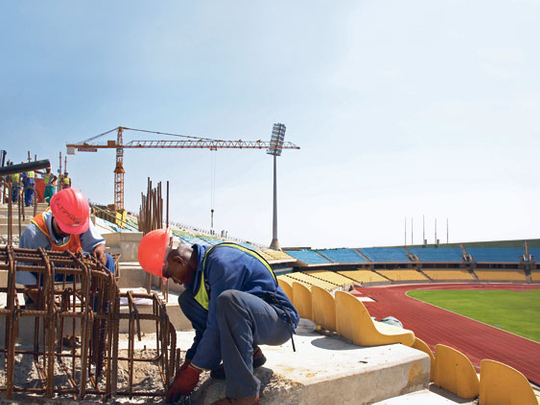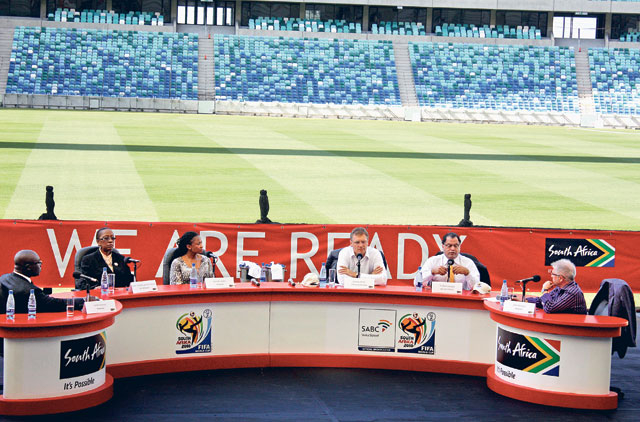
South Africa is doing as much for the Fifa 2010 World Cup as the football extravaganza is doing for the country. From building new stadiums and airports to the renovation of roads and beachfront property, no effort is being spared to make sure that Fifa 2010 turns out to be the best in the history of Fifa World Cups.
A host of new projects and the administration of the countrywide campaign to ensure readiness for the event are complete and the only thing left to do is to sustain the level of excitement. South African Tourism, the organising body working alongside Federation of International Football Association (Fifa) in bringing the World Cup to the country, announced that the country is officially ready for the world after the lights were turned on at all 10 football stadiums where the matches are to be held.
Preparations for the month-long event started almost six years ago when the country was chosen as the host for the 2010 World Cup. Five new football stadiums were built with the event in mind, as were new airports. Various infrastructure facilities across the country were expanded and renovated. Over $9.6 billion (Dh35.2 billion) was spent on changing the road infrastructure, $1 billion on new taxis and $1 billion on Durban's new airport, according to South African President Jacob Zuma.
The R21 highway between O.R. Tambo Airport and Pretoria and the N1 between Johannesburg and Pretoria have been upgraded. The Taxi Recapitalisation programme has allocated $1 billion towards the replacement of old taxis with new vehicles, he said.
The country has obtained loans to fund heavy investments in infrastructure for the event, but the long-term economic benefits far outweigh the cost.
A study by accounting firm Grant Thornton said the games will generate 13 billion rand (Dh6.2 billion) during the World Cup and leave a lasting impact on the economy worth 93 billion rand from indirect spending and new infrastructure benefits. It said foreign fans would spend about 8.8 billion rand, with Fifa and other officials and teams expected to cover the remaining 13 billion rand needed.
New job opportunities
Besides the monetary benefits, the developments around the country have raised hopes of an expected 3.6 million new job opportunities, presenting a welcome boost for the economy.
Local Organising Committee chief executive Danny Jordaan said: "We have created more than 412,000 jobs in construction alone preparing for the World Cup. We have, in preparations, seen more women enter the construction industry. And South Africa is a permanent construction site. Ours is a growing economy, and jobs will continue to be available in South Africa for the people who have worked on creating the infrastructure we offer the world today."
Perceived as the jewels of the country, five stadiums underwent renovation, and five are brand new. These have been certified by Fifa as world-class sports venues which the country will benefit from not just during 2010 World Cup, but for years to come. In the past, South Africa has hosted many world sports events such as the World Cup for rugby, cricket and other sports. However, the country's capacity and capability to host global events will be tested to the limits as it undertakes its largest world event yet.
In addition to the 10 stadiums, 52 football pitches have been planned in communities across South Africa, as well as another 52 around the African continent. They will serve as hubs for sport and community development and take the promotion of football to another level, President Zuma said.
Airports get capacity boost
Over the last three years, Airports Company of South Africa has invested about 16 billion rand in airport infrastructure, according to Monhla Hlahla, chief executive of Airports Company of South Africa, which manages the country's 10 airports. All the airports in the country, except Durban international, have increased capacity by at least 15 per cent in terms of terminal space, she said.
Early May, the country inaugurated its King Shaka International Airport that can handle up to 7.5 million passengers a year. The operator is still working out the kinks while also testing out its temporary terminals that considerably boost passenger-handling capacity.
Growth patterns have been devised keeping in mind that the peak capacity needed for an event of similar scale won't be reached again in at least 15 years, Hlahla said, referring to the justification of temporary facilities that the country has used many times before. She said the facilities provide seamless functionality and can barely be noticed as being any less than permanent terminals in terms of functionality.
With new fixtures and temporary terminals, South Africa is prepared to handle the arrival of up to 500,000 fans. "For us, we expect 369,000. But we'll even be comfortable with 500,000, because we manage a network of 10 airports," she said.
The World Cup will attract about 350,000 more foreign visitors this year, a number that would, in the medium to long-term, result in greater repeat visits and word-of-mouth recommendations for the destinations, Zuma said this month.
Minister of Tourism Marthinus van Schalkwyk said the country expects 10 million visitors this year, slightly more than last year's 9.9 million. Last year, in the absence of any special tourist-attracting event, the country saw a growth in arrivals of 3.6 per cent, outperforming most international markets in 2009.
"As much as the spotlight will fade from South Africa, our destination will have enjoyed huge global attention during the World Cup," he said. The number of television viewers globally are expected to hit 26 billion.
Meanwhile, President Zuma said the country would pass the 10-million visitor mark this year due to the travel show Indaba.
Besides the 350,000 visitors expected for the World Cup, the billions of television viewers around the world are also expected to change the country's tourism sector for the better.
Jérôme Valcke, Fifa's general secretary, said that while the country initially had a slow pace of preparation, he is confident of the World Cup's success.
"The stadiums will be at least 95 per cent full for the games next month. Of this I am certain," he said.
Some countries had approached the governing body but it had never changed its mind about South Africa's capabilities. Fifa never entertained thoughts of moving the event from South Africa since it was first awarded in 2004. Not for safety and security reasons. Not for infrastructure or capability reasons. Not for technical reasons, he said.
On last count in mid-May, Valcke said that 130,000 tickets were still unsold, only 2 per cent of the total. The body earlier had difficulty selling tickets online, its primary sales method, having failed to take into account the low internet penetration in the country and the rest of Africa.
"We were able to resolve the issues through negotiating with the relevant stakeholders in government and our partners to make World Cup tickets easily available to South Africans," he said, taking a valuable lesson for the forthcoming World Cup in Brazil.
The increased awareness of South Africa will be leveraged to boost the country's reputation as a leisure tourism destination, with its natural attractions including wildlife and land, culture and cuisine.
After the World Cup, the South African Tourism company will work on changing the mindset of the people and promote it as a leisure destination first and foremost but also as a business tourism destination since the country has large convention centres.
Lucas Radebe, a local football legend and former captain of the country's national team and now the Fifa ambassador for World Cup 2010, said there is much to see in South Africa besides the games.
"For us, it's important that we go out there and reach out and pass the message — assure [people] it is safe to come to South Africa. To assure them that South Africa is a great country, capable of hosting great events, a country with great tourist destinations, with possibilities.
"This is a dream come true for South Africa and they must come and celebrate with us," he said.













